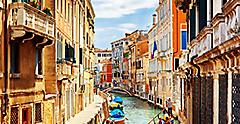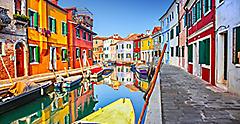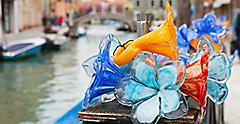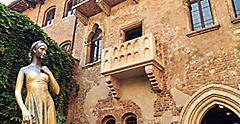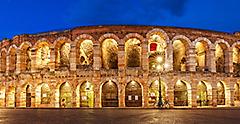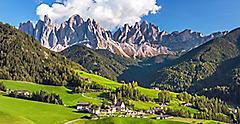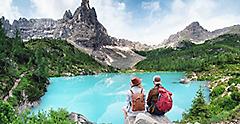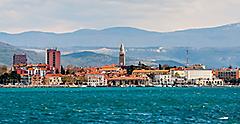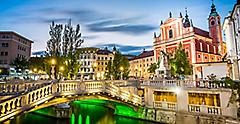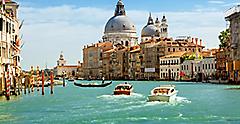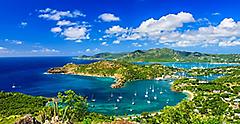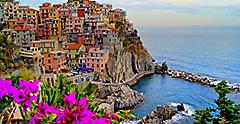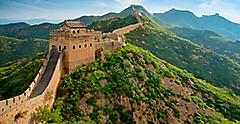By Robert Schrader | Published on February 16, 2024
Take A Mini Cruise To Burano And Murano
When in Venice, you don't have to travel far from St. Mark's Square to have an adventure. One of my favorite ways to shake up an ordinary Venice trip is to set my GPS for Fondamente Nove pier, where "vaporetto" — water taxis — depart for several secondary islands in the Venetian Lagoon. My first stop is always Burano, a small place that packs an outsized travel punch.
The first thing you'll notice about Burano as you're walking along its canals is how colorful the houses are here. This aspect is what makes it one of my favorite Venice excursions. Beyond snapping selfies in front of whichever buildings match the outfit you're wearing, you can explore the 7th-century Torcello Basilica, learn about the history of Burano lacemaking at a small but informative museum and have lunch waterside. All of Venice's best specialties are on offer, including my personal favorite, spaghetti al nero di seppia — black spaghetti with squid ink.
From here, board any Venice-bound vaporetto, all of which stop at Murano on the way back. Although its name sounds similar to Burano's, there are some key differences. While Murano, too, has canals, its architecture is a bit more muted in tone and resembles what you'd find in Venice more closely than it does Burano.
Murano is also home to an important crafting tradition: glassmaking. Now, if you're getting ready to embark on a cruise from Venice to Greece, the idea of buying fragile souvenirs might not appeal to you, and I have two things to say about that. First, you don't have to buy anything here. You can pay a few euros to support the shop owners and, in exchange, watch the fascinating glassmaking process, bringing home photos and videos as your primary keepsakes.
Second, most shops can ship gifts all the way home and wrap them to make sure they survive the journey. This is nice even if you'll be heading directly home after your time day-tripping from Venice. The fewer items you have to pack when traveling, the better — particularly if they're something fragile such as a box full of Murano glass. The hardest part about this is limiting yourself to just a few pieces. You'll want to buy them all!
Visit Romeo And Juliet's Hometown
One reason I love exploring Italy so much is that every Italian city has its own story and cast of characters. In the case of Verona (which is located about 90 minutes from Venice via trains that depart at least twice an hour) this is literally true. Verona was the setting of "Romeo and Juliet," a love story so famous I don't think it needs any introduction.
Visiting Juliet's Balcony itself and the charming courtyard it looks out over would be an alluring destination even without such a famous literary history. Like many of the Italian cities you'll have visited on your seven-night Europe cruise, Città Antica is full of storied architecture, including the Torre dei Lamberti bell tower and Iglesia de Santa Anastasia.
Of course, Verona's culinary world is something to be explored on cruises of Italy. While you can enjoy more typical Italian pasta and pizza offerings throughout Verona's old town, you also owe it to yourself to try the city's most famous dish, risotto con tastasal. Flavored and thickened with tastasal — a minced pork heavily seasoned with salt and pepper — this hearty rice dish will make you fall in love with Verona.
Another of my favorite ways to appreciate the beauty of Verona is to ascend to Castel San Pietro — and not just to explore its Romanesque interior. The view of Verona rising above the aqua-green waters of the Adige River is postcard-perfect and is particularly great to enjoy after exploring the city's narrow streets for yourself. Afterward, you can head back down, cross over Ponte Nuovo Bridge and reward yourself with an aperitivo. I love a Campari spritz, but your mileage may vary.
If you want to enjoy another body of water after being out at sea on cruises from Venice, you can take a second local train from Verona to Lake Garda. Enjoy an afternoon in the peninsular town of Sirmione, which juts nearly a mile out into the lake and provides an amazing view of the mountains rising behind its waters. Or, rent a car (either in Verona or back in Venice) and move toward the horizon instead of just gazing at it.
Do A Dolomites Road Trip
The Dolomites are one of the most accessible and interesting parts of the Italian Alps. Well, they're technically Italian. In fact, the storybook villages that dot the twisty roads winding through their foothills are arguably as Austrian in appearance (and sometimes in cuisine, culture and language) as they are Italian. But that makes this pan-European region, known as South Tyrol, all the more exciting to explore.
Unless you decide to stay in a smaller town or village, you'll probably set your GPS for Cortina d'Ampezzo, the hub of the Dolomites — and host city of the upcoming 2026 Winter Olympics — which is just two hours from Venice by car. The hand-carved wooden balconies, inviting eateries or friendly locals will be sure to charm you.
Tre Cime di Lavaredo is the most recognizable landscape of the Dolomites. Named for the fact that it appears to be three chimneys, this towering landform boasts relatively easy trails that encircle its base. Or, if you're more adventurous, climb high above it to take in stunning views. However, the parking lot fills up fast, so plan your free days accordingly before or after your seven-night western Mediterranean cruise — you'll ideally come here first thing in the morning.
Next, make a beeline for Lake Sorapis, whose sapphire waters collect in a bowl-shaped reservoir at the bottom of several glacier-topped peaks located roughly halfway between Tre Cime and the center of Cortina. The two-hour hike here isn't especially difficult, but it can be harrowing at times with only a narrow railing separating you from the valley below. My advice? Hang on tight if you need to, walk as far from the edge as possible, and don't think too much about it. Literally hundreds of people hike this trail every day.
Now, even if you decide not to drive all the way into the more Austrian part of South Tyrol to photograph the iconic Church of St. John in the Val di Funes, don't be fooled: When it comes to day trips from Venice, the Dolomites may call for a little more time. In order to enjoy this part of Italy, you really need to spend at least a night here, even though you could technically drive to Cortina and back in a single day with a few hours to spare. This would make a perfect two- to three-day add-on after your cruise ship brings you back to Venice!
See Why Everyone's Talking About Slovenia
Thanks to Italy's impressive high-speed train network, you could theoretically use Venice for a jumping-off point to anywhere in the country. Alternatively, you can board a bus bound for Ljubljana, capital of Slovenia, Italy's underrated neighbor. Depending on how long you have here, you can potentially see the entire country in one go.
I usually like to base myself in the capital the entire time. This way, I can spend a day or two exploring Ljubljana, whether I'm looking down on the city from medieval Ljubljana Castle or strolling (and dining alfresco) along the Ljubljanica River and the fairy tale buildings that line either side of it.
At this point, I head for the hills — or mountains, more accurately. Slovenia's Julian Alps are an oft-overlooked part of Europe's most-famous mountain range, but one of my favorites regardless. First up on the itinerary is Lake Bled, whose electric blue waters surround an island church you can rent a canoe and paddle to. Or, as is the case back in Ljubljana, you can ascend Bled Castle and take the whole scene in from a bird's-eye view.
A second lake, Bohinj, features clearer waters than Bled and doesn't have any landmarks as obvious as Bled Church, but it is nonetheless refreshing, especially during the summer. It's also usually pretty calm on the tourist front. Part of what makes Slovenia one of my favorite Venice excursions is that it's an authentic, low-key destination where most of the other people you encounter are local Slovenians.
If you have more than a couple of days to spare, you could also head to Slovenia's own short but beautiful coastline. The town of Piran, in particular, is amazing, and from some vantage points almost seems like a lost Italian port. If admiring its terracotta roof tiles from various viewpoints doesn't unlock your inner photographer, head down to its quiet, understated rock beaches where many sun worshipers will have set up their own umbrellas and laid down their own towels.
Venice, Vidi, Vici!
Get Royal Deals, Sign Up Today
Related Articles

5 Best Weekend Getaway Ideas
READ MORE
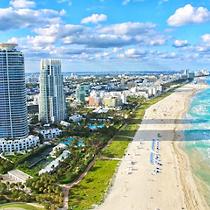
Best Weekend Cruises from Florida | Royal Caribbean Cruises
READ MORE

Top Cruise Essentials To Pack For A Weekend Getaway
READ MORE

Family Vacations on Liberty of the Seas
READ MORE

